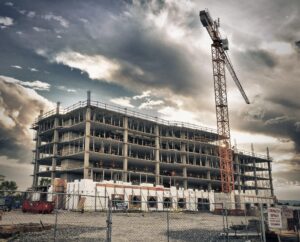In an era where technology continually reshapes industries, the impact of artificial intelligence or AI in architecture is a pivotal topic for professionals. Whether you’re a real estate developer, store owner, property manager, or taking your first steps into constructing a new building, understanding the role of AI in architecture can significantly enhance your projects. This article offers an expert insight into how AI is revolutionizing the field, tailored to meet the interests and challenges of our clientele at Guzzo Architects.
Artificial Intelligence or AI in architecture is transforming the industry by offering tools for design optimization, project management, and predictive analysis. Key applications include generative design software, AI-powered project management tools, and predictive maintenance systems. These tools aid in creating more efficient, sustainable, and cost-effective designs, while also streamlining project timelines and reducing operational costs.
Key Takeaways:
- AI-driven generative design software fosters creativity and efficiency.
- AI-powered project management tools streamline complex processes.
- Predictive maintenance systems ensure long-term sustainability and cost savings.
As we delve deeper into the subject, you’ll discover specific AI applications that are not only cutting-edge but also practical for your everyday architectural needs. Whether it’s enhancing design creativity or optimizing property management, AI in architecture is a game-changer for industry professionals. Keep reading to explore how these tools can be integrated into your next project, driving innovation and efficiency.
AI in Architecture: Ways to Boost Efficiency and Design
Design Optimization with AI
The integration of AI in architecture, particularly through generative design, marks a significant advancement in design optimization. This technology employs algorithms to create a plethora of design options, adhering to predefined criteria such as material usage, energy efficiency, and spatial needs. The ability of this software to rapidly assess and optimize from hundreds of alternatives allows architects to achieve designs that are not only innovative and aesthetically pleasing but also practical and sustainable. The result is a harmonious blend of form and function, pushing the boundaries of traditional architectural design towards a more efficient and environmentally conscious approach.
AI-Powered Project Management
In the realm of project management, AI in architecture shines by automating routine tasks, optimizing resource allocation, and enhancing decision-making processes. This leads to more accurate project timelines, budget adherence, and overall project success.
AI tools in project management reduce the risk of human error, improve communication among teams, and ensure that projects are completed on time and within budget. These tools are particularly beneficial in managing large-scale architectural projects with multiple stakeholders and complex logistics.
Predictive Analysis and Maintenance
Predictive analysis in architecture utilizes AI to anticipate future maintenance needs and potential structural issues. This proactive approach saves time and resources in the long run, ensuring the longevity and safety of buildings.
AI’s predictive capabilities extend to optimizing building operations, enhancing energy efficiency, and reducing maintenance costs. This not only aligns with sustainability goals but also ensures that buildings remain functional and aesthetically pleasing for longer periods.
Overview of Different AI Applications in Architecture
The architecture industry is increasingly benefiting from specific AI tools and applications, each designed to address different aspects of the design and construction process. Below are some notable AI applications, along with their contributions to the field:
- Autodesk Revit with Dynamo: This combination is widely used for generative design in architecture. Dynamo, as a plugin for Revit, enables architects to use visual programming to automate tasks and generate complex geometric structures.
- Graphisoft ArchiCAD: Leveraging Graphisoft’s AI technology for efficient design and documentation, ArchiCAD is known for its BIM (Building Information Modeling) capabilities, which allow architects to not only design buildings but also simulate construction and maintenance.
- SketchUp with D5 Render: D5 render utilizes AI for real-time rendering and visualization, this combination enhances the design process by providing quick and realistic visualizations of architectural models.
- Rhino 3D with Grasshopper: Rhino is a 3D modeling tool that, when used with its plugin Grasshopper, allows for advanced algorithmic design. AI is increasingly being integrated into these algorithms for more efficient design processes.
- ArchiFrame for ArchiCAD: This extension introduces AI into the timber construction design process, optimizing material usage and improving structural design efficiency.
- Bentley Systems’ SYNCHRO: An AI-powered construction project management tool that integrates with BIM data to provide advanced planning, management, and visualization capabilities.
- IBM Watson IoT for Building Insights: Utilizing AI for building performance analysis, this tool helps in optimizing energy usage and operational efficiency in buildings.
- Katerra: This is a technology-driven offsite construction company that uses AI for optimizing building assembly and reducing waste, thereby streamlining the construction process.
- PlanGrid (now part of Autodesk Construction Cloud): This AI application offers project management solutions, improving onsite communication and document management.
- Spacewell: A smart building platform that uses AI to enhance facility management, focusing on occupant comfort and energy efficiency.
- TestFit.io: An AI tool that helps in real estate feasibility studies, generating instant site plans for various building types, thus aiding in the decision-making process for development projects.
These AI applications in architecture demonstrate the industry’s shift towards more efficient, sustainable, and innovative practices. By integrating these tools into their workflows, architects and developers can significantly enhance the design, construction, and maintenance of buildings.
Embrace AI in Architecture for a Future of Innovation and Excellence
AI in architecture is not just a trend but a transformative force. It offers unparalleled advantages in design optimization, project management, and predictive analysis. By embracing these technologies, architects, and developers can achieve higher efficiency, innovative designs, and sustainable solutions.
For those in the architectural field, exploring AI’s potential is a step toward innovation and excellence. Contact Guzzo Architects at 201-939-1446 to learn how integrating AI can elevate your projects and set you apart in the industry.
Embrace the future of architecture with AI, and witness how it can transform your approach to design and project management for a more efficient, creative, and sustainable future in the built environment.
How Does AI in Architecture Influence Client-Architect Collaboration?
AI in architecture significantly enhances client-architect collaboration by streamlining communication and improving the design process. Tools like AI-enhanced virtual reality (VR) and augmented reality (AR) allow clients to experience and interact with designs in a realistic way, leading to more effective feedback and quicker decision-making. Additionally, AI-driven platforms facilitate easier sharing of design updates and modifications, ensuring that clients are more involved and informed throughout the project lifecycle. This increased engagement and clarity in communication foster a more collaborative and efficient partnership between clients and architects.
We Want to Hear From You!
As you’ve explored the transformative role of AI in architecture, we’re eager to continue this conversation with you. Share your thoughts and insights on our social media platforms. How do you see AI shaping the future of architecture? What potential do you see for AI in enhancing design and collaboration in your projects? Join us online to discuss these exciting developments and become a part of our community’s dialogue on innovation in architecture.








